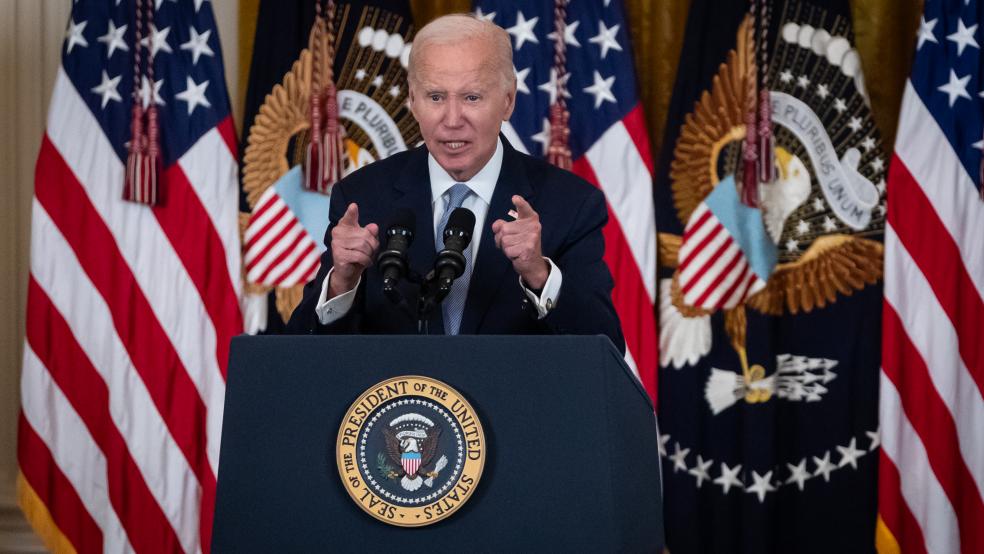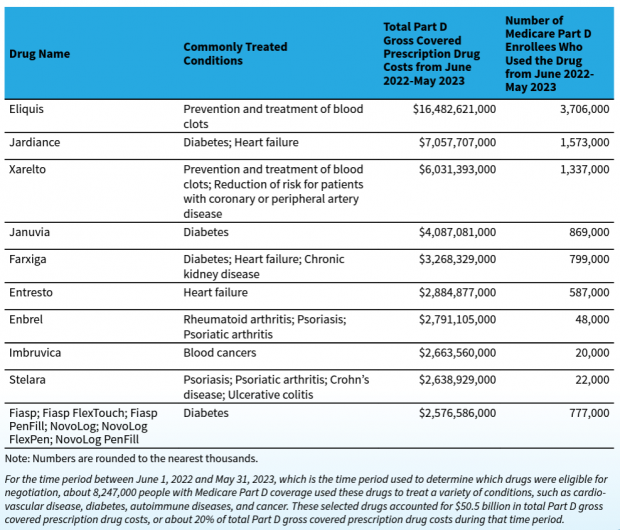The Biden administration on Tuesday announced the first 10 prescription drugs it has selected for unprecedented federal price negotiations with drugmakers, a milestone in efforts to reduce U.S. health care costs and improve the finances of the Medicare program.
President Joe Biden hailed the announcement, which is the result of his signature Inflation Reduction Act, passed last year. The law allows Medicare to negotiate the prices of certain prescription drugs for the first time, though it is far more limited than some Democrats had wanted. The government had previously been prohibited from engaging in such negotiations.
“For far too long, Americans have paid more for prescription drugs than any major economy. And while the pharmaceutical industry makes record profits, millions of Americans are forced to choose between paying for medications they need to live or paying for food, rent, and other basic necessities. Those days are ending,” Biden said in a statement. “There is no reason why Americans should be forced to pay more than any developed nation for life-saving prescriptions just to pad Big Pharma’s pockets.”
The list includes widely used blood thinners Eliquis and Xarelto as well as diabetes drugs Jardiance, Januvia, Farxiga, Fiasp and some related insulin products. Other drugs on the list are used to treat heart problems, autoimmune disease, cancer and psoriasis: Entresto, Enbrel, Imbruvica and Stelara (see chart below).
The list was chosen from among the top 50 eligible medications that drive the highest Medicare spending. To be eligible, a drug must have been on the market for several years without competition.
The administration said that the medications on the list account for a combined $50.5 billion in total gross costs to Medicare’s Part D prescription drug program, or about 20% of the covered costs in the year ending May 31, 2023, the period used to determine eligibility for negotiations. Eliquis alone cost Medicare more than $16 billion over the past year, while Jardiance cost more than $7 billion and Xarelto more than $6 billion.
The administration also says that Medicare enrollees taking the 10 drugs on the list paid $3.4 billion in out-of-pocket costs for them last year. It projects that up to 9 million seniors will see savings under the new law.
Overall, the new negotiations are expected to save Medicare about $100 billion over 10 years. “It’s pretty obvious that there are huge savings to be had here, for even a small number of drugs,” Dr. Benjamin Rome, a health policy researcher at Brigham and Women’s Hospital and Harvard Medical School, told CNN.
Manufacturers have until the beginning of October to agree to negotiations with the Centers for Medicare and Medicaid Services. The talks will take place this year and next, with agreed-upon new prices to be published by September 1, 2024. The prices would only take effect starting in 2026.
The Centers for Medicare and Medicaid Services is also slated to choose up to 15 more drugs for negotiations on prices to take effect in 2027 and another 15 for 2028, with up to 20 more drugs subject to negotiations each year after that. Part B drugs, which are administered by doctors, can be included as of 2028.
Companies that refuse to negotiate or reject the government’s “maximum fair price” would face a steep excise tax as high as 95% of the drug’s U.S. sales or forced withdrawal from Medicare and Medicaid. The pharmaceutical industry, the U.S. Chamber of Commerce and six individual drug companies object to those terms. They are challenging the Biden law as unconstitutional and are seeking to block the new negotiations — a fact that the president and Democrats point to proudly and are likely to continue to highlight throughout election season. Biden posted on social media Tuesday: “For years, Big Pharma blocked us from allowing Medicare to negotiate lower drug prices. Keeping prices high to increase profits and extend patents to suppress fair competition. This time, we beat Big Pharma.”
Big Pharma says the fight isn’t over, though.
Stephen J. Ubl, president and CEO of the Pharmaceutical Research and Manufacturers of America, the industry’s largest trade group, called the government announcement “the result of a rushed process focused on short-term political gain rather than what is best for patients.” He said many of the drugs on the list already have significant rebates and discounts and warned about political interference in the marketplace. “Giving a single government agency the power to arbitrarily set the price of medicines with little accountability, oversight or input from patients and their doctors will have significant negative consequences long after this administration is gone,” he said in a statement.
Manufacturers of the 10 drugs announced Tuesday said that the new law threatened their research and development efforts and could curb innovation. “Boehringer Ingelheim, which makes Jardiance, and Bristol-Myers Squibb, which makes Eliquis, argued that their drugs were being targeted because they benefit so many — leading to higher spending — and not because they charged too high of a price,” The Washington Post notes.
The bottom line: Experts have tended to side with the Biden administration regarding the legality of the new drug pricing program, but the court challenges will take time to play out. The savings from the negotiations could be significant, but they’re also still years away.






